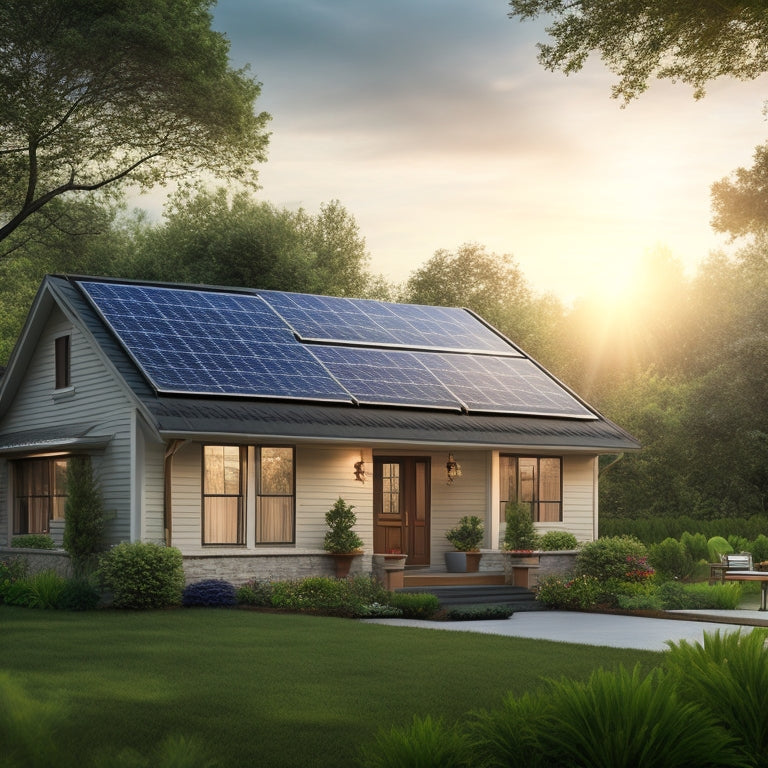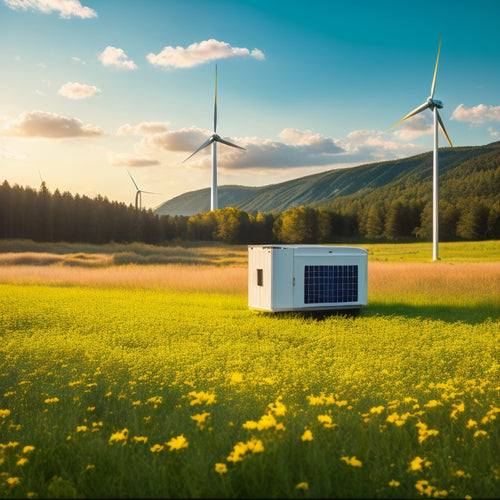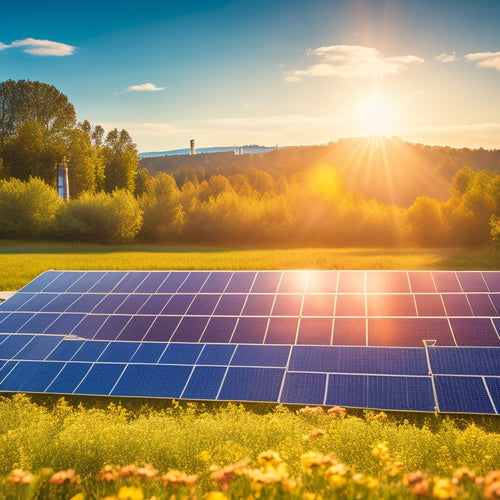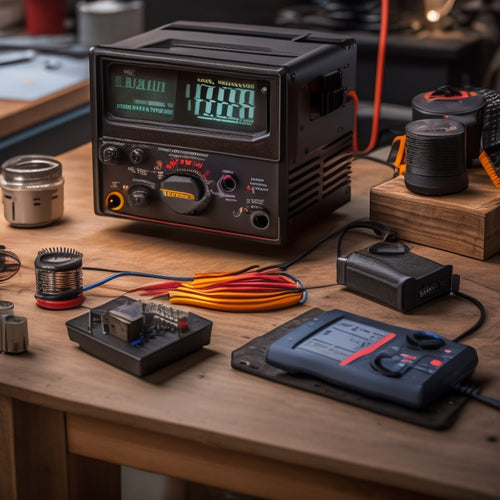
Solar Power for House Price
Share
When you invest in a solar power system for your house, you can expect to save hundreds or thousands of dollars annually on energy costs while potentially increasing your property value by up to 17%. Achieving net zero energy bills, you'll reduce your grid reliance and carbon footprint. High-efficiency solar panels and ideal roof alignment are essential for maximizing energy output. Furthermore, government incentives can cover up to 26% of the total system cost. By understanding the key factors influencing your solar power system's effectiveness, you'll be well on your way to enjoying significant energy cost savings and a potentially higher resale value.
The Essentials
- Installing solar power systems can increase property value by up to 17% and home resale worth by up to $15,000.
- Solar panels can enhance property appeal to buyers, translating to higher resale value and attracting eco-conscious buyers.
- Homes with solar panels sell faster and are in high demand, giving homeowners a competitive edge in the real estate market.
- Investment in solar power can lead to significant energy cost savings, reducing grid reliance and freeing up budget for other expenses.
- Government tax credits and local incentives can cover up to 26% of the total solar panel system cost, making solar energy more affordable.
Zero Energy Bills
You'll benefit from considerable energy cost savings when you switch to solar power, as you'll be generating your own electricity and relying less on the grid.
By utilizing renewable energy from the sun, individuals can greatly reduce their carbon footprint and contribute to a healthier environment for future generations Renewable Energy.
Additionally, with a well-designed solar panel system, you'll have the opportunity to break free from reliance on the grid and reduce your electricity bills.
With a well-designed solar panel system, you can achieve net zero energy, where your energy production equals your energy consumption.
This means you'll be paying little to nothing for your energy bills, freeing up more money in your budget for other expenses.
Energy Cost Savings
The most significant advantage of solar power for your house is the potential to eliminate your energy bills entirely. By utilizing renewable energy from the sun, you can reduce your reliance on the grid and save a substantial amount on your energy costs.
With solar power, you can achieve energy efficiency and cost reduction, freeing you from the burden of rising energy prices. Additionally, installing rooftop solar panels can increase your home's value and appeal, making it a more attractive selling point should you decide to move Residential Solar Solutions.
Solar panels convert sunlight into electricity, which you can use to power your home. By generating your own energy, you'll reduce the amount of electricity you need to purchase from your utility company. This translates to lower energy bills and more money in your pocket.
In fact, with a solar power system, you can potentially save hundreds or even thousands of dollars per year on your energy costs. By investing in solar power, you'll not only reduce your energy expenses but also increase your energy independence, giving you more control over your energy usage and costs.
Net Zero Energy
One of the most coveted benefits of solar power for your house is achieving net zero energy, where your energy bills dwindle to virtually zero. This means you'll no longer be held hostage by fluctuating energy prices or reliant on the grid.
With net zero energy, you'll enjoy energy independence, producing and consuming exactly what you need. By integrating solar panels, a charge controller, inverter, and battery storage into a single, compact unit, such as an All in One Solar Power System, you can simplify the shift to renewable energy and guarantee a steady power supply even when the grid is down.
To achieve this, your solar power system must generate enough electricity to offset your energy consumption over the course of a year. This requires careful system design, considering factors like your energy usage patterns, roof size, and local solar irradiance.
When done correctly, the result is a sustainable living situation where your energy bills are eliminated, and your carbon footprint is greatly reduced. Fundamentally, net zero energy is the ultimate goal of solar power for homeowners.
Increases Property Value Fast
You'll find that installing solar power systems can greatly enhance your property's real estate appeal, making it more attractive to potential buyers.
In fact, switching to renewable energy solutions can also lead to energy efficiency and reduce your bills.
This increased appeal directly translates to a higher resale value, which can be a major selling point if you decide to put your house on the market.
Boosts Real Estate Appeal
Installing solar panels can increase your property value by up to 17%, according to the National Renewable Energy Laboratory. This significant enhancement can be attributed to the improved appeal of your property to potential buyers.
Solar panels not only provide a clean source of energy but also add a touch of modernity and sophistication to your home's exterior. The sleek, high-tech design of solar panels can raise your home's curb appeal, making it stand out from the competition.
In today's market, solar aesthetics play an essential role in attracting eco-conscious buyers who value sustainable living. By investing in solar power, you're not only reducing your carbon footprint but also catering to the growing demand for environmentally friendly homes.
According to market trends, homes with solar panels are in high demand, and buyers are willing to pay a premium for them. By installing solar panels, you're increasing your property's appeal to a wider range of buyers, giving you a competitive edge in the real estate market.
Increases Home Resale Value
Increasing your property's resale worth is a top priority for homeowners, and solar power can greatly contribute to this goal. By installing solar panels, you're not only reducing your carbon footprint but also increasing your property's appeal to potential buyers.
According to solar market trends, homes with solar panels sell faster and for higher prices than those without. In fact, a study found that solar panels can increase your home's resale worth by up to $15,000.
Buyer preferences are shifting towards energy-efficient and eco-friendly homes, and solar power is at the top of their list. By investing in solar power, you're catering to these preferences and making your property more attractive to potential buyers.
Additionally, solar panels require minimal maintenance and can last for decades, making them a significant asset to any homeowner. By increasing your home's resale worth, you're giving yourself more freedom and flexibility when it comes to selling your property.
With solar power, you can rest assured that your investment will pay off in the long run.
High-Efficiency Solar Panel Cells
You're likely familiar with the importance of high-efficiency solar panel cells in maximizing your solar power system's energy output.
When evaluating these cells, you'll want to take into account the cell efficiency rating, which measures the percentage of sunlight converted into electricity.
High-efficiency solar panels are designed to provide ideal power output and minimize electricity bills, and are often equipped with advanced features such as silicon photovoltaic cells and microinverters.
Advanced panel design features, such as bifacial cells and multi-busbar technology, can also greatly enhance energy production.
Cell Efficiency Rating
A minimum of 15% cell efficiency rating is typically required for high-efficiency solar panel cells, with top-performing models boasting efficiencies exceeding 22%.
You're looking for solar panels that can convert sunlight into usable energy with maximum efficiency. Cell efficiency rating is a critical factor in determining the overall performance of your solar panel system. It measures how well each cell converts sunlight into electrical energy.
You want to maximize energy conversion to get the most out of your solar panels. High-efficiency cells enable you to generate more power per unit area, reducing the overall size of your solar panel system.
This, in turn, leads to lower installation costs and increased energy independence. When evaluating solar panels, look for high-efficiency cells with a proven track record of providing exceptional cell performance.
Advanced Panel Design
High-efficiency solar panel cells often feature advanced panel designs that optimize energy conversion.
You'll find that these advanced designs prioritize panel aesthetics, which not only enhance the visual appeal of your solar installation but also improve its overall performance.
Innovative materials, such as bifacial or PERC (Passivated Emitter and Rear Cell) technology, are integrated into the design to maximize energy output. These materials allow your solar panels to capture more sunlight and convert it into usable electricity.
Advanced panel designs also incorporate state-of-the-art architecture, such as multi-busbar or shingled cells, to reduce energy losses and increase efficiency.
Additionally, the design may include features like optimized wire configuration, reduced reflection, and enhanced thermal management to further elevate energy production.
By combining these innovative materials and design elements, high-efficiency solar panels can achieve extraordinary energy conversion rates, giving you more power and freedom from traditional energy sources.
With advanced panel design, you can reveal the full potential of solar energy and enjoy greater independence from the grid.
Check Your Roof Size
You'll need to assess your roof's size and orientation to determine how many solar panels can be installed and how much energy they'll produce. A larger roof area generally allows for more panels, increasing your energy output.
For instance, renewable energy systems can greatly reduce your utility bills. In addition, with proper energy efficiency solutions, you can maximize your energy output.
However, the orientation of your roof also plays an essential role, as a south-facing roof receives more direct sunlight than a north-facing one.
Roof Size Matters
Behind every successful solar panel installation lies a roof perfectly suited to accommodate it. As you consider utilizing solar power for your house, you'll need to assess your roof's size and compatibility. A larger roof provides more space for solar panels, but it also increases installation costs. You'll need to weigh the benefits of generating more electricity against the added expense.
When evaluating your roof, consider the type of roof materials used. Asphalt shingles, metal, and tile roofs are common, but some materials may be more suitable for solar panels than others. For instance, asphalt shingles are generally easier to work with, while metal roofs may require specialized installation techniques.
To determine the ideal solar panel configuration for your roof, you'll need to calculate the available space and assess any obstructions, such as vents, skylights, or chimneys.
A professional solar installer can help you optimize your roof's layout to maximize energy production while minimizing installation costs. By carefully evaluating your roof's size and characteristics, you can guarantee a successful and cost-effective solar panel installation.
Roof Orientation Counts
Ideal energy harvesting depends on the alignment of your solar panels with the sun's path. As you consider installing solar panels on your roof, it's vital to assess your roof's orientation to maximize sunlight exposure.
The roof angle, in particular, plays a significant role in determining the amount of energy your solar panels can generate. A south-facing roof with an angle between 30° and 40° is optimal for capturing sunlight.
If your roof has a different orientation, don't worry – you can still utilize solar energy. However, you may need to adjust the angle of your solar panels or use specialized mounting systems to compensate for the non-optimal orientation.
To determine the best roof orientation for your solar panels, consider the following factors: the direction your roof faces, the pitch of your roof, and any obstructions that may cast shadows on your solar panels.
Government Incentives Boost Savings
You'll be pleased to know that the government offers tax credits to homeowners who invest in solar power systems.
These credits can markedly reduce the upfront cost of installation, making solar energy a more affordable option for you.
Tax Credits Available
When considering solar power for your house, one of the most considerable advantages lies in the various tax credits available, which can greatly offset the initial investment costs.
You're eligible for a federal tax credit of up to 26% of the total solar panel system cost, which can substantially reduce your taxable income. This credit is available for residential solar installations, allowing you to claim the solar deductions on your tax return.
Additionally, you may be eligible for state and local tax incentives, depending on where you live.
These can include rebates, tax credits, or property tax exemptions, further increasing your savings. It's important to research the specific incentives available in your area, as they can vary considerably.
Frequently Asked Questions
Can I Install Solar Panels on a Rented Property?
You'll need to review your tenant agreements before installing solar panels on a rented property, ensuring you're allowed to make modifications. You may still be eligible for solar incentives, but it's vital to get your landlord's consent to avoid any potential disputes.
How Long Does It Take to Install Solar Panels?
You'll typically need 1-3 days for a standard solar panel installation, depending on your roof's complexity and the system's size. The installation timeline also hinges on panel efficiency, with higher-efficiency panels often requiring more time and skill.
Are Solar Panels Resistant to Extreme Weather Conditions?
As you're probably wondering, it's no coincidence that solar panels are engineered to withstand extreme weather conditions. You'll be relieved to know that they're built with weather durability in mind, designed to resist harsh winds, hail, and intense temperatures with ease.
Can I Use Solar Power for My Electric Vehicle?
You can definitely use solar power to charge your electric vehicle, leveraging solar charging to fuel your travels while maximizing energy savings, and gaining independence from the grid, all while reducing your carbon footprint.
Do Solar Panels Require Regular Maintenance?
You'll be surprised to know that 90% of solar panels still operate at 90% capacity after 20 years! To guarantee your solar panels last, you'll need to perform regular maintenance, which can cost around $100-$300 annually, but enhances their longevity.
Final Thoughts
You've made it this far, and now you're just a step away from utilizing the power of the sun to fuel your home. Remember, "well begun is half done." With solar power, you'll not only reduce your energy bills to zero but also enhance your property value considerably. High-efficiency solar panels will guarantee maximum energy output, and government incentives will further elevate your savings. So, what are you waiting for? Take the leap and start generating clean energy for your home today!
Related Posts
-

Sustainable and Eco-Friendly Generators for a Reduced Carbon Footprint
Sustainable and eco-friendly generators are perfect for cutting your carbon footprint and increasing energy efficienc...
-

Advantages of Solar Generating Systems Over Traditional Energy
Solar generating systems provide several key advantages over traditional energy sources. You'll experience lower long...
-

Key Features of a DC to AC Converter
A DC to AC converter features high efficiency and conversion rates, which reduce energy costs and improve performance...


